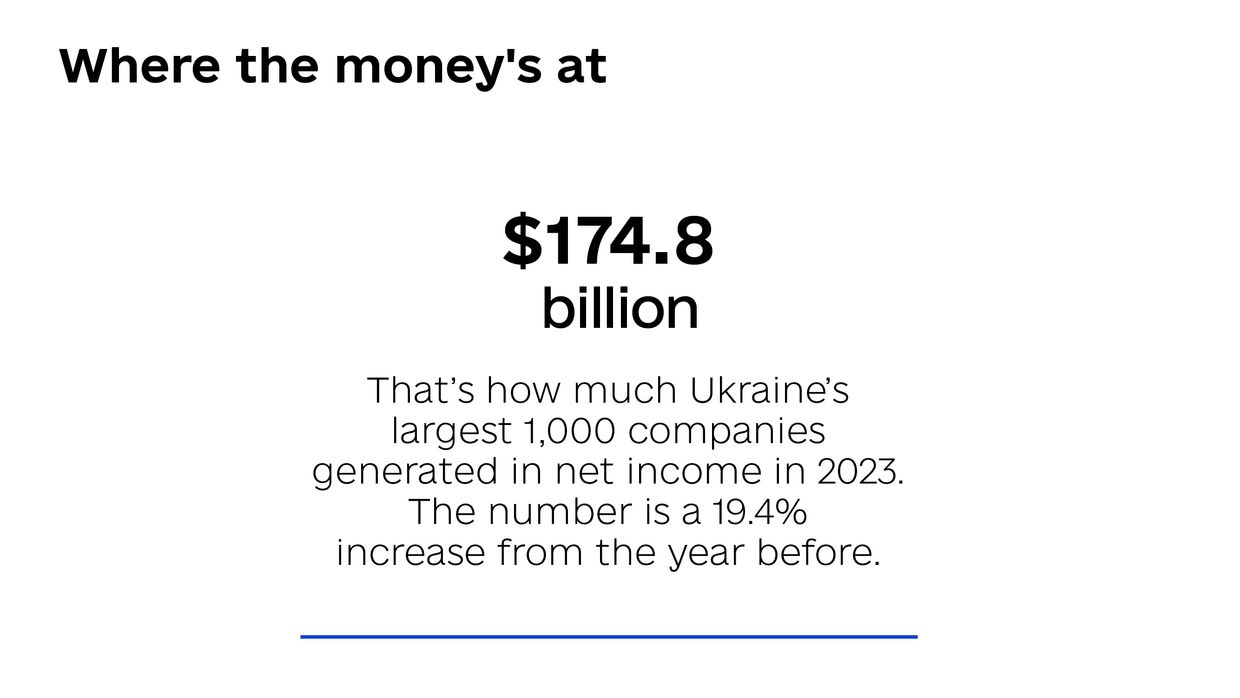Ukraine Business Roundup — French billionaire closes historic deal in Ukraine

The following is the Sept. 10, 2024 edition of our Ukraine Business Roundup weekly newsletter. To get the biggest news in business and tech from Ukraine directly in your inbox, subscribe here.
French billionaire Xavier Niel’s investment company NJJ Capital on Sept. 9 closed a deal to merge two telecoms companies in Ukraine, marking one of the largest M&A deals in independent Ukraine’s history.
Who’d he buy? Niel acquired Lifecell, the country’s third-largest mobile operator, and Datagroup-Volia, one of the largest fixed telecom and pay-TV providers in the country. The billionaire is planning to merge the two companies now that the deal is finalized.
The only other notable merger and acquisition in Ukraine was in 2005 when Indian Mittal Steel purchased the Kryvorizhstal complex for $4.8 billion, before merging with Arcelor a year later and becoming ArcelorMittal.
Exciting news, yes, but also a testament to the lack of high-profile business deals and foreign investment in Ukraine over the last thirty-three years.
According to Forbes Ukraine, the deal is estimated to be worth more than $650 million. Niel paid $525 million for Lifecell and as much as $120 million for Datagroup-Volia.
The total value of the acquisition, including the purchase price and investment over the course of five years, will amount to $1.5 billion, Datagroup-Volia CEO Mykhailo Shelemba said in April.
Who’s Xavier Niel? The billionaire, whose investments span Europe, Africa, and Latin America, is considered a pioneer in the telecom market. His telecom giant Iliad, which owns one of France’s largest internet providers Free, also announced big investments into artificial intelligence last year. Some have called him the Elon Musk of France.
After the deal closed yesterday, Niel said he was "pleased to announce the completion of this landmark French investment in Ukraine's telecom sector, which we believe will provide significant and tangible benefits to customers, the market, and to the country."
"The closing of this landmark transaction will serve as a signal to others that Ukraine offers compelling opportunities, and that the time to invest is now," he said.

Gunshy investors
Speaking of foreign investment — the hype around Ukraine’s defense tech developments since the start of the full-scale invasion isn’t translating into big checks from foreign investors.
In fact, money has been painfully slow to come into the country from abroad, Kyiv Independent contributor Kollen Post writes in his latest.
How slow are we talking? Foreign investment into Ukraine’s defense tech startups over the past year totaled a little over $9 million, according to Ukrainian authorities. For comparison, U.S. defense tech unicorn Anduril recently raised $1.5 billion in a funding round in August.
Weapons firms in Ukraine are facing barriers from all sides, Post writes. Reactionary policy at home from the central bank, and abroad, where major insurers won’t touch Ukraine or defense, are making it hard for startups to find funding.
“So far, we’ve seen zero interest from traditional venture capitals in putting a dollar into Ukraine,” says Perry Boyle, an American investor in Ukrainian weapons start-ups.
Read the full story here.

Banks are raking it in, and Kyiv wants its cut
Ukrainian banks continue posting record profits, earning nearly Hr 120 billion ($2.9 billion) in the first seven months of 2024 — a 22% increase from last year, according to Opendatabot.
Why are they doing so well? As the Kyiv Independent reported earlier, Ukrainian banks’ influx of cash is largely the result of war-time policies rather than commercial skills.
The government already reacted to the sector’s profits by retroactively increasing taxes on profits from 2023 from 15% to 50% in early December.
Lasting higher profits could translate to another tax increase, according to Volodymyr Landa, senior economist at the Center for Economic Strategy (CES).
“Successful financial results increase the likelihood of a tax increase for banks. Either retrospectively, as in 2023, or for future periods,” he told the Kyiv Independent.
Not everyone is happy about it. The International Monetary Fund (IMF), the Finance Ministry, and the National Bank (NBU) have opposed another tax hike recently proposed in parliament.
But Ukraine’s budget deficit and anticipated financing problems next year may mean Kyiv is left with little choice, Landa said.
Read more here.

Oil and gas, energy, agriculture, metallurgy, and IT saw a decline in their share of the top 1,000 companies' revenues indicating challenges in key markets, Ukrainian analytical firm YouControl said in a recent report.
Retail, wholesale, automotive dealerships, food processing, and machinery sectors showed relatively higher revenue growth among the top companies.
The gambling sector emerged as a new player, with six companies entering the top 1,000 and contributing 0.7% of total revenues.
This section was brought to you by KI Insights, the research unit of the Kyiv Independent. For more from KI Insights, click here.

Answering your questions about the IMF’s loan program with Ukraine
If you’ve been following the news on foreign aid to Ukraine, you’ve likely come across the International Monetary Fund’s $15.6 billion loan program providing budget support to Kyiv.
But do you know how an IMF loan program works and why countries call on the international financial institution to come to its aid?
The Kyiv Independent has you covered in this comprehensive explainer on the IMF’s lending program to Ukraine — the first time the fund has ever loaned to a country at war — and how Ukraine has fared so far.
(Spoiler alert: Ukraine is so far hitting program targets and has already received $7.6 billion under the program — it’s also expected to face pressure from the fund during its current program review happening now.)
Read the explainer here.
What else is happening
Negotiations underway on Azeri gas transit to EU via Ukraine, Azerbaijan says
"Russia, Ukraine, and European institutions have approached us in connection with the continuation of gas transit through the territory of Ukraine,” Azerbaijani President Ilham Aliyev said on Sept. 6. "For months we have been making great efforts to come to a common denominator,” he said. Ukraine currently transits Russian gas to the EU as part of a deal signed in 2019, which is set to expire in December 2024.
EU provides $44 million for energy aid ahead of winter
"Russia is relentlessly targeting Ukraine's energy infrastructure. Temperatures will soon go down, so we are stepping up our humanitarian aid to Ukrainians in need," European Commission President Ursula von der Leyen wrote on X on Sept. 6. The new package will provide funds for repair works, electricity, heating, and shelter, von der Leyen said.
Ukraine reduces state debt by $9 billion after restructuring effort
Restructuring its external debt with bondholders involved the exchange of 13 series of government Eurobonds and one series of state-guaranteed Eurobonds for Ukravtodor (Ukraine's state-owned road agency), worth about $20.5 billion, for eight new series of Eurobonds with a value of $15.2 billion. The exchange reduced Ukraine's external debt by about $9 billion, Ukraine’s Finance Ministry said.
Ukraine’s foreign currency reserves rise to $42.3 billion as of Sept. 1
The country’s reserves grew by 13.7% from the past month when reserves were at $37.2 billion, Ukraine’s central bank said in a statement. "Such dynamics were driven by large inflows from international partners, which exceeded (the bank's) net FX sales and Ukraine's FX debt repayments," the bank said.
Zelensky, Meloni agree to work on organizing reconstruction conference next year
“We talked about cooperation and preparation for a conference in 2025,” President Volodymyr Zelensky said in Italy at the annual Ambrosetti Forum following a meeting with Italian Prime Minister Giorgia Meloni, Bloomberg reported. The president also told Italian media he met with the CEOs of several Italian companies. “There are many things we are working on with Ukraine, including the post-war reconstruction conference in 2025 and hospitals,” said Meloni.










